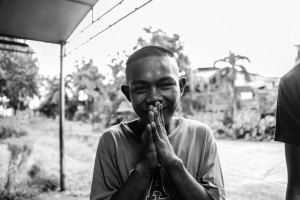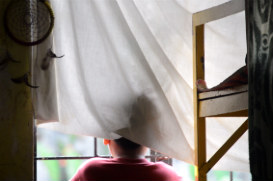Images and article contributed by Zach Jorgensen
A child stares into nothingness. His hair is matted; his face a pale sickly complexion and his teeth yellow. His clothes are threadbare and unwashed. His arms and legs are covered in sores and scabs from the scabies. The child is deaf. He cannot speak and cannot understand signs. No one knows his name. The center staff refers to him as “Boy X”, and the other kids address him with “Tanga,” which means stupid in the local language.
The room he sits in is sparsely furnished. Two small, barred windows allow a little light in. By the windows, there is an altar with two mannequins dressed up as Mother Mary and the baby Jesus. Rows of plywood bunk beds line the wall. There aren’t enough beds for the children in here, so the small ones sleep on the cold concrete floor. This child sleeps on the floor next to the door of the bathroom.
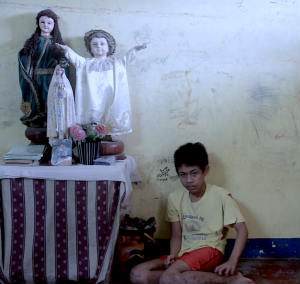
The smell of the dormitory is overwhelming. It’s a rancid mixture of mold, fecal matter, rot and decay. It emanates mostly from the bathroom. The stench is overwhelming. The white tiles in the lavatory are a brownish grey and the toilets are un-flushed. The stagnant water on the floor breeds mosquitoes.
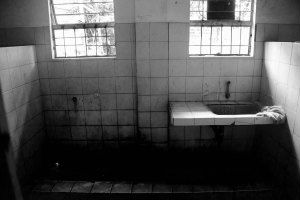
I’m at the former center of the one of Stairway’s current peer motivators. We came with the intention of teaching the children how to make bracelets, dream catchers and puppets. We lived with the 24 clients the center holds for three days.
The clients of this center range from six year olds that were abandoned to mentally challenged kids to deaf kids to children in conflict with the law. There were even two senior citizens living with them because they had nowhere else to stay. All these people share one room without supervision from the faculty that run the center.
Their days consist of watching television and sleeping. They do not attend school while they are here. If it weren’t for us giving them activities they would be locked in the dorm room sleeping or watching TV. To make life exciting for them, we would constantly play basketball and soccer with them during the day and at night we would sing and play our guitars. When I asked the staff as to why they didn’t organize more activities for the children, they shrugged and said they didn’t have the funding for it as this is a government-ran center.
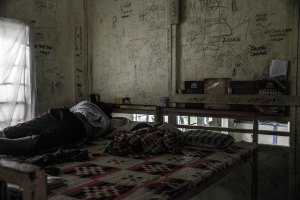
One day while I was reading my book, one of the boys came up to me and asked if he could borrow my camera. Thinking that it might be interesting to see what he would film or take pictures of, I let him. Twenty minutes later he comes back laughing. “Watch this! Funny!”
The video is of a naked deaf child in the shower. Three of the bigger boys surround him and are throwing punches at his body while yelling at him calling him stupid, retarded, and mute. The boy is crying but no sound is coming out of his mouth.
I’m at the former center of Ismael, one of Stairway’s current peer motivators. Ismael came to us three years ago. When he arrived he was skinny, pale, and reclusive. “When I first got to Stairway I was already thinking of ways to escape.” he laughs. “Then I realized I would have to swim, so I decided to give it a try.” Seeing him as the young man with me now, you would never have thought he had had a troubled past. He is constantly playing guitar, singing and acting as an older brother to all the young boys, giving support and guidance. He’s always smiling. Hence his nickname,“Smile”.
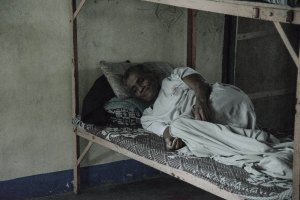
The faculty know that things like this happen but decide to turn a blind eye to them. It’s easier than dealing with the issue. It’s easier to let the children watch TV rather than stimulate them intellectually. It’s easier to lock them in a room and make them sleep than to plan out activities. It’s easier to throw a bunch of children that nobody wants responsibility for into a place where no one will see them, rather than trying to help them. We left with countless photographs, memories of the unfairness of the world and motivation to make it better.
We arrived at the center with the intention of teaching the children how to make bracelets, dream catchers and puppets. We lived with the 24 clients the center holds for three days.
In comparison with some centers, it was better; with others, much worse. When we first entered the compound we saw the greenery that surrounded the building. There was even a small vegetable garden where the kitchen plucked its vegetables from for the meals. The boys had a basketball ring where they could play pick-up…when they had a ball.
When we walked into the building, it was a completely different scene. Everything was broke and covered in a layer of black grime. A smell clogged the air. Ismael was greeted by delighted squeals from the women who worked there and wide smiles from the men. They fussed over him like a child back from a long trip. Then we saw the children.
Most centers focus on one sort of client: deaf children, children with mental handicaps, the elderly, abandoned children, youth in conflict with the law, the list goes on. This specific center, however, did not. There were six year olds running around in oversized t-shirts, deaf children, incarcerted youth, homeless senior citizens and the mentally challenged. They all shared one room.
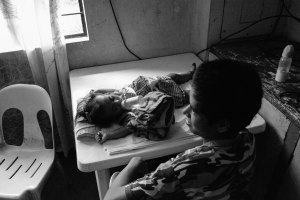
The nextfew days proved challenging,not only in the aspect of teaching the kids what we came to teach, but because the center did not have the funds to provide the minimal materials we needed, such as paper, pencils, thread and scissors. On top of that we found ourselves constantly looking after the children ourselves while the houseparent on duty was nowhere to be found. One twenty-one year old client named Marjon said, “Yeah they do this a lot. I am usually the one to tell the kids to take a shower or give them their medicine at night.”
When I asked him why he was here when he wasn’t a minor, he smiled. “They messed up my paperwork. It’s fine with me though. I can see my wife and kids as much as I like, so that already makes this a lot better than prison.”
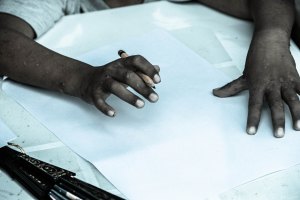
A trivial problem that came to our attention while we were there, was the treatment of the deaf children in the center. They were constantly beaten up and hassled by the other children. It saddedned me to see how a misconception rooted in the society manifested itself in unprovoked violence against children. The common judgement of a deaf person here in the Philippines is that if he’s deaf, he’s also dumb. The older boys made one child sit and rewrite whatever they wrote. “I am def and dumb” they wrote. “I am deaf and dumb” he copied, over and over. They laughed.

Another tragedy in this center are the young ones. They’re malnourished. Their teeth are rotting. Their arms and legs are covered in scabies. They are not receiving any formal education. The faculty knew that these problems are present, but decide to turn a blind eye. It’s easier than dealing with the issues. It’s easier to let the children watch TV rather than stimulate them intellectually. It’s easier to lock them in a room
and make them sleep than to plan out activities. It’s easier to throw a bunch of children that nobody wants responsibility for into a place where no one will see them, rather than trying to help them.
